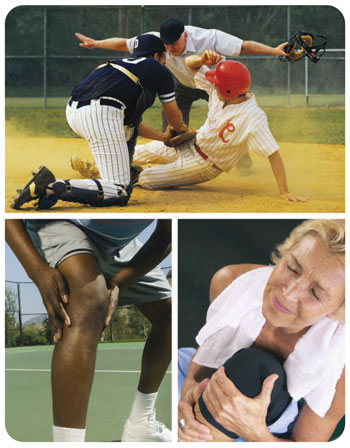 Meniscus tears are among the most common knee injuries.
Meniscus tears are among the most common knee injuries.
Athletes, particularly those who play contact sports, are at risk for meniscal tears. However, anyone at any age can tear a meniscus.
The meniscus is a wedge-shaped piece of cartilage that acts as a “shock absorber” be-tween your thighbone and shin-bone. They are tough and rubbery to help cushion the joint and keep it stable.
Sudden meniscal tears often happen during sports. Players may squat and twist the knee, causing a tear. Direct contact, like a tackle, is sometimes involved. Older people are more likely to have degenerative meniscal tears. Cartilage weak-ens and wears thin over time. Aged, worn tissue is more prone to tears.
You might feel a “pop” when you tear a meniscus. Most people can still walk on their injured knee. Many athletes keep playing with a tear. Over 2 to 3 days, your knee will gradually become more stiff and swollen.
The most common symptoms of meniscal tear are:
- Pain
- Stiffness and swelling
- Catching or locking of your knee
- The sensation of your knee “giving way”
- You are not able to move your knee through its full range of motion
After discussing your symptoms and medical history, your Orthopaedic Clinic surgeon will examine your knee. He will check for tenderness along the joint line where the meniscus sits. This often signals a tear.
Your doctor may order imaging tests to help confirm the diagnosis. X-rays do not show meniscal tears, but they may show other causes of knee pain, such as osteoarthritis. An MRI can create better images of the soft tissues of your knee, like the meniscus. MRI is available onsite at The Orthopaedic Clinic, maximizing your convenience.
Treatment of your tear will depend on the type of tear you have, its size, and location. Along with the type of tear you have, your age, activity level, and any related injuries will factor into your treatment plan.
If your tear is small and on the outer edge of the meniscus, it may not require surgery. As long as your symptoms do not persist and your knee is stable, nonsurgical treatment may be all you need. Non-surgical treatment consists of rest, ice, anti-inflammatory medications, and sometimes steroid injections and physical therapy.
Unfortunately, many meniscus tears do not get better with non-surgical treatment. If your symptoms persist with nonsurgical treatment, your doctor may suggest arthroscopic surgery.
Knee arthroscopy is one of the most commonly performed surgical procedures. In it, a miniature camera is inserted through a small incision. This provides a clear view of the inside of the knee. Your surgeon then inserts miniature surgical instruments through other small incisions to trim or repair the tear. Occasionally more complex treatment is indicated including meniscus transplantation. The sports medicine specialists at The Orthopaedic Clinic are the only surgeons in the area offering this innovative procedure.
After a straightforward meniscus trimming, most patients are walking normally within 2-4 weeks and can resume normal activities as soon as tolerated.
If you have knee pain, let our experts at The Orthopaedic Clinic evaluate you and help you get back to the pain-free, active life you once knew.
